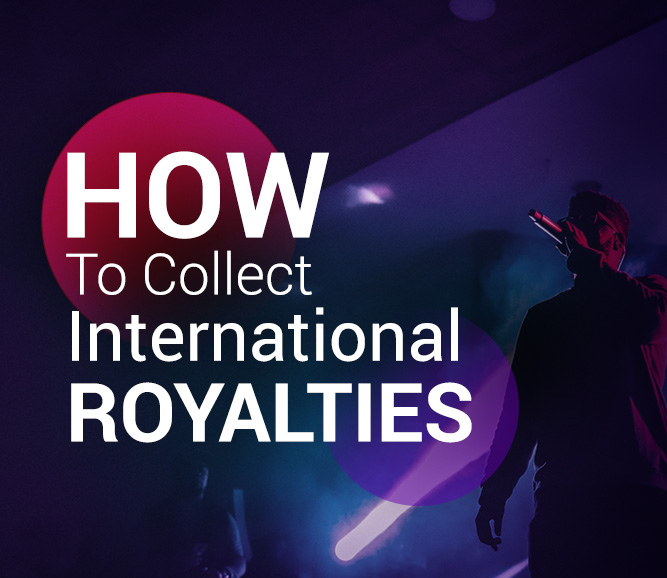The world has gotten much smaller. For musicians, gaining exposure worldwide has become easier with global distribution access and music services like Apple and Spotify rippling into India, Asia, South America and beyond. However, it can be challenging when it comes time to collect your international royalties.
A surprising number of musicians have generated international royalties that they do not even know about. To collect those global royalties, it is necessary to submit accurate metadata...
Show All...
The world has gotten much smaller. For musicians, gaining exposure worldwide has become easier with global distribution access and music services like Apple and Spotify rippling into India, Asia, South America and beyond. However, it can be challenging when it comes time to collect your international royalties.
A surprising number of musicians have generated international royalties that they do not even know about. To collect those global royalties, it is necessary to submit accurate metadata to the various collection societies and/or subpublishers in the territories where your music is being performed, streamed or recorded. If you are a member of ASCAP or BMI, they have reciprocal agreements with various collection societies throughout the world. In order to unlock the potential of those agreements, care must be taken to ensure that all information about your music is correct across all platforms. When your works are commercially active in a foreign country, the local society tracks the performance and/or streams of your song, collects the fees, and forwards the performance royalties to ASCAP and BMI, while your mechanical royalties go directly to your publishing administrator.
Multi-Territory Collection and the Challenge of Exchange Rates
The management of worldwide royalty rights is organized through geographic territories more than individual countries. For example, Europe can involve dealing with multiple societies like STIM in Sweden, SACEM in France, or BUMA STEMRA in Belgium, Holland and Luxembourg. To license and collect on your repertoire, your publishing administrator must register your song catalog metadata with each society in the territories where your music is commercially active.
As a self-published artist, the extent of the registrations can pose a huge challenge when submitting your music metadata to every territory worldwide. Royalty payments from foreign territories are subject to the fluctuation of exchange rates of the various international currencies. Additionally, varying foreign tax laws can also impact the net amount you receive. Some countries provide for non-citizens and foreign businesses to register in order to avoid certain taxes from being withheld prior to trans-national royalty distributions.
The Challenges of Metadata in Multiple Territories
Metadata should be one of your biggest concerns when distributing your music across multiple territories. Metadata is the information you include about your music, and errors can be costly on an ongoing basis. Using the format CWR (Common Works Registration), your data submission file must be properly formatted and include the song title, writer names, song shares, the ISWC number (International Standard Work Code), artist name, track length, record label, genre, etc. Though there is no official standardization surrounding metadata, CWR is the most accepted and submittable format. Various platforms and territories have different rules and requirements, but this type of metadata submission is crucial to the proper payment of your royalties.
Collection Societies vs Subpublishers
Publishing income is incredibly varied. PROs like ASCAP and BMI, foreign societies and international sub-publishers play a primary role in collecting royalties. The fact is, there are literally hundreds of collection organizations responsible for collecting your royalties worldwide. Royalty income often comes through the form of various micropayments from multiple countries with different commissions, rules, regulations, and payment schedules.
Let's say you are affiliated with BMI and you have a song getting airplay in 10 territories worldwide. You would need to wait for BMI to collect your royalties from 10 different societies. Then after each society takes their cut, BMI passes these royalties on to you. But what if that song suddenly has 500,000 streams on Spotify across 25 different territories? You may end up waiting months, or even years for those royalty payments to find you, and some may be missed if the metadata is not consistently accurate..
The Benefits of a Publisher/Administrator
In the complex world of royalties today, it has become vitally necessary to have a publishing administrator. A well-established administrator will be in a good position to handle the complexity of the royalty collection processes. They can register, track songs, and collect income direct at source from different societies around the world. They may also work with international subpublishers who can assist in placing your songs commercially in countries that use a lot of American music such as Japan, Italy or Germany. The goal is to ensure that you receive what you earn as soon as possible from the use of your music abroad.
Without a publishing administrator, you may never collect or even know about all the royalties due to you throughout the world. It is a time consuming process, and missing even one type of royalty channel such as international mechanicals could mean missing out on more than half of your income.
The bottom line? It's a smart business decision to work with a publishing administrator to make sure you collect what you earn. Their job is to stay on top of the business side of your songs, helping you collect royalties around the world and freeing your time to do what you do best... create!
Show Less...